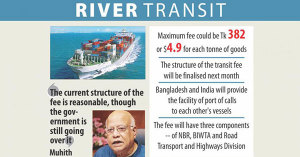It is good to see that concrete decisions are now being taken to operationalise the earlier understanding to deepen bilateral connectivity with India, said Mustafizur Rahman, adding that important work was done in this context by the core committee set up by the government earlier which may serve as a reference point.
Published in The Daily Star on Wednesday, 28 October 2015.
River transit fees to be fixed next month
Shipping secretaries of Bangladesh and India will meet in New Delhi on Nov 16-17
Rejaul Karim Byron and Md Fazlur Rahman
 Bangladesh may propose to charge India a maximum transit fee of Tk 382 or $4.9 for each tonne of goods ferried through its river routes.
Bangladesh may propose to charge India a maximum transit fee of Tk 382 or $4.9 for each tonne of goods ferried through its river routes.
The proposal may be placed at the scheduled meeting of the two countries’ shipping secretaries in New Delhi on November 16 and 17.
The fee structure, which was drafted during an inter-ministerial meeting last month, would have a minimum rate of Tk 282.
The structure of the final transit fee will come following next month’s secretary-level meeting, a shipping ministry official said.
The fee will have three components. One, the National Board of Revenue will charge Tk 130 a tonne, which can go up to Tk 180 if it has to provide security.
Two, the Bangladesh Inland Water Transport Authority will realise Tk 10 per tonne for facilitating smooth transit of goods. Besides, if its warehouse is used, a separate charge will be levied; the warehouse usage charge has not been finalised yet.
Three, the Road Transport and Highways Division has demanded a fee of Tk 1.024 per tonne per kilometre for using its road network. It will cost Tk 52 to transport a tonne of goods from Ashuganj to Akhaura.
It was initially decided that the road transit fee would be fixed on the basis of the motor vehicle agreement signed recently by Bangladesh, Bhutan, India and Nepal (BBIN).
But as it would take time to finalise the BBIN transit fee, Bangladesh has come up with the charge on a temporary basis for allowing India to use its road network, said the shipping ministry official.
It is good to see that concrete decisions are now being taken to operationalise the earlier understanding to deepen bilateral connectivity with India, said Mustafizur Rahman, executive director of the Centre for Policy Dialogue.
He said important work was done in this context by the core committee set up by the government earlier which may serve as a reference point.
A dedicated fund may be set up with the financial resources to be generated for the development of the related infrastructure to facilitate movement of goods and cargo, he said.
Finance Minister AMA Muhith said: “The fee structure that has been recommended now is the correct one. The earlier one is useless.”
He said the current structure of the fee is “quite reasonable”, although the government is still going over it.
The government had set up a committee in 2011 after then Indian prime minister Manmohan Singh’s visit to Bangladesh to fix the transit fees. But the government did not publish the report of the committee.
At present, the neighbouring country provides Tk 10 crore per annum to maintain the navigability of the Bangladeshi rivers that India uses to transport goods.
An official said Bangladesh will propose to increase the rate during the secretary-level meeting, and India has also hinted in favour of the hike.
The transit fee has been fixed under the revised inland water transit and trade protocol Bangladesh signed with India in June this year.
Nasir Arif Mahmud, head of the technical committee on shipping protocol, said the fee has been fixed at an inter-ministerial meeting.
Policymakers’ consent will be taken before placing the proposal at the secretary-level meeting, he said.
The fee has been fixed in line with global practices and the guideline of the World Trade Organisation, said Mahmud, also an additional secretary to the shipping ministry.
Under the existing framework, Bangladesh also charges a number of other fees for providing transit to India. The charges will continue as well, said another shipping ministry official.
Bangladesh charges Tk 2,500 for every shipping voyage and Tk 2,100 as piloted charge.
It charges Tk 30 per tonne for landing shipping charge and Tk 40 a tonne for labour handling.
Bangladesh realises Tk 10 per tonne for allowing India to use its two canals. There are some other charges under the existing arrangement.
The BIWTA earns Tk 76.25 crore a year on account of various charges including berthing, unloading and use of jetties. It will go up once the new fee comes into effect, officials said.
Earlier, the NBR has proposed imposing 100 percent bank guarantee for Indian transit cargo, but the inter-ministerial meeting has decided not to pursue it as the BIWTA already takes Tk 2 lakh as security money.
Bangladesh and India will provide the facilities of port of calls to each other’s vessels.
A port of call is a port where a ship docks in the course of a voyage, especially to load or unload passengers or cargo, to obtain supplies, or to undergo repairs.
Each side has five ports of calls that will be used to transit goods as well as import and export goods.
The next month’s secretary-level meeting will discuss about adding one more ports from each side to the list.
The Indian side has proposed Bangladesh’s Pangaon, while the Bangladeshi side has proposed Bandel and Dhulian ports across the border.
If Bandel or Dhulian is used as ports of call, it will be easier to ferry stones being used to construct the Padma bridge.


